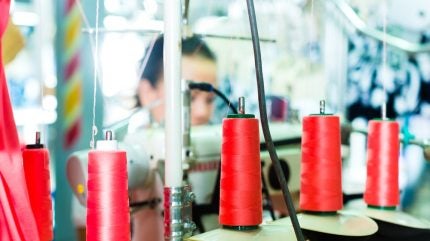
In an era where “eco-friendly” can be a vague marketing claim, Taiwan’s leading mills are giving it technical teeth. They are not just meeting standards but setting them, transforming the island into the definitive sourcing hub for brands that refuse to compromise between performance and planetary responsibility.
This industry-wide shift is being powerfully supported by programs like the Textile Export Promotion Project (TEPP). Commissioned by Taiwan’s International Trade Administration and implemented by the Taiwan Textile Federation, TEPP is instrumental in spotlighting a new guard of manufacturers proving that the most advanced materials can also be the most circular. They are turning coffee grounds into odor-absorbing base layers, building fully recyclable waterproof shells, and pioneering dyeing methods that slash water consumption. Here, we spotlight six TEPP-backed firms that exemplify this paradigm shift.
From bean to base layer: The rise of agri-waste yarns
The concept of a circular economy finds its most creative expression in the work of Singtex and Grandetex, two mills valorizing agricultural byproducts. They’re not just recycling; they’re upcycling waste into high-value, performance-driven fibers.
Singtex Corporation’s S.Café® technology is a masterclass in this philosophy. By embedding spent coffee grounds directly into polyester yarn, Singtex creates a filament with inherent, permanent functionality. The microporous structure of the coffee particles delivers exceptional odor control, rapid drying, and natural UV reflection—performance that won’t wash out. It’s a brilliant solution that gives a second life to waste while enhancing the wearer’s comfort on the trail. Similarly, Grandetex Development Co. Ltd. has turned its attention to the local cocoa industry. Its Secao® yarn is crafted from cacao husks that would otherwise be discarded. The resulting fiber, rich in natural polyphenols, is inherently anti-odor and moisture-wicking. By engineering these agri-waste particles at a nano-level, Grandetex delivers performance that feels cool to the touch and contributes to a fabric that is biodegradable at its end-of-life. With robust certifications like bluesign® and GRS, these innovations are more than a novelty; they are a validated, scalable solution for brands seeking a compelling sustainability story backed by tangible performance.

Closing the loop: Recycled polymers and next-gen finishes
For the demanding world of outerwear, durability and weatherproofing are non-negotiable. Li Peng Enterprise and Hitex Textile Co. are tackling this challenge by re-engineering the very building blocks of technical fabrics.Li Peng Enterprise (Libolon™) is a leader in closing the loop on petroleum-based fibers. It’s RePET® and ReEcoya® technologies transform post-consumer plastic bottles and discarded nylon into high-tenacity filaments. The real innovation, however, lies in their solution-dyeing process. By introducing color at the polymer melt stage—before the yarn is even spun—Li Peng eliminates the water- and energy-intensive post-dyeing process entirely. The result is a dramatic reduction in chemical and water usage, coupled with superior colorfastness that withstands harsh use and repeated laundering.

Meanwhile, Hitex Textile Co. focuses on the critical interface between the wearer and the elements. The firm engineers high-performance waterproof/breathable fabrics—including PU/PTFE laminates and featherlight softshells that meet demanding ≥15K/15K specifications—using entirely PFC-free DWR finishes. Crucially, Hitex champions mono-material construction. By designing laminates where every layer is polyester, they are creating outerwear fabrics that are not just made from recycled content but are genuinely designed for recyclability, a holy grail for the outdoor market.
The softer side of sustainability: Certified knits for modern activewear
This integrated approach extends to the knitwear sector, where Wu Luen Knitting Co Ltd and Da Fon International Development Co Ltd are providing certified, high-performance solutions for everything from base layers to footwear.
A warp-knit specialist with over four decades of experience, Wu Luen expertly blends function with responsibility. Its collections seamlessly incorporate GRS-certified recycled PET, bio-based nylons, and biodegradable fibers alongside traditional materials. These textiles are then elevated with functional finishes for moisture management and odor control, offering brands a one-stop shop for performance knits that meet the highest environmental and social benchmarks, verified by bluesign®, Oeko-Tex, and GRS.

Da Fon International complements this by acting as a crucial supply chain partner, connecting global brands with Taiwan’s ecosystem of certified mills. Emphasizing its own GRS- and Oeko-Tex-certified supply chain, Da Fon curates collections that feature organic, recycled, and biodegradable options. Their commitment goes beyond the factory floor, with community initiatives like beach cleanups underscoring a holistic corporate ethos.
Taiwan’s strategic edge
Together, these six firms—Grandetex, Singtex, Li Peng, Hitex, Wu Luen, and Da Fon—are not merely suppliers. They are strategic partners for a global industry in transition. By delivering a complete portfolio of certified, eco-innovative textiles that meet precise technical demands, they are transforming sustainability from a corporate goal into a commercial advantage. For brands navigating the complex demands of the modern consumer, Taiwan offers a clear path forward: a future where performance and responsibility are woven into the very same thread.
Ad by TITA.


